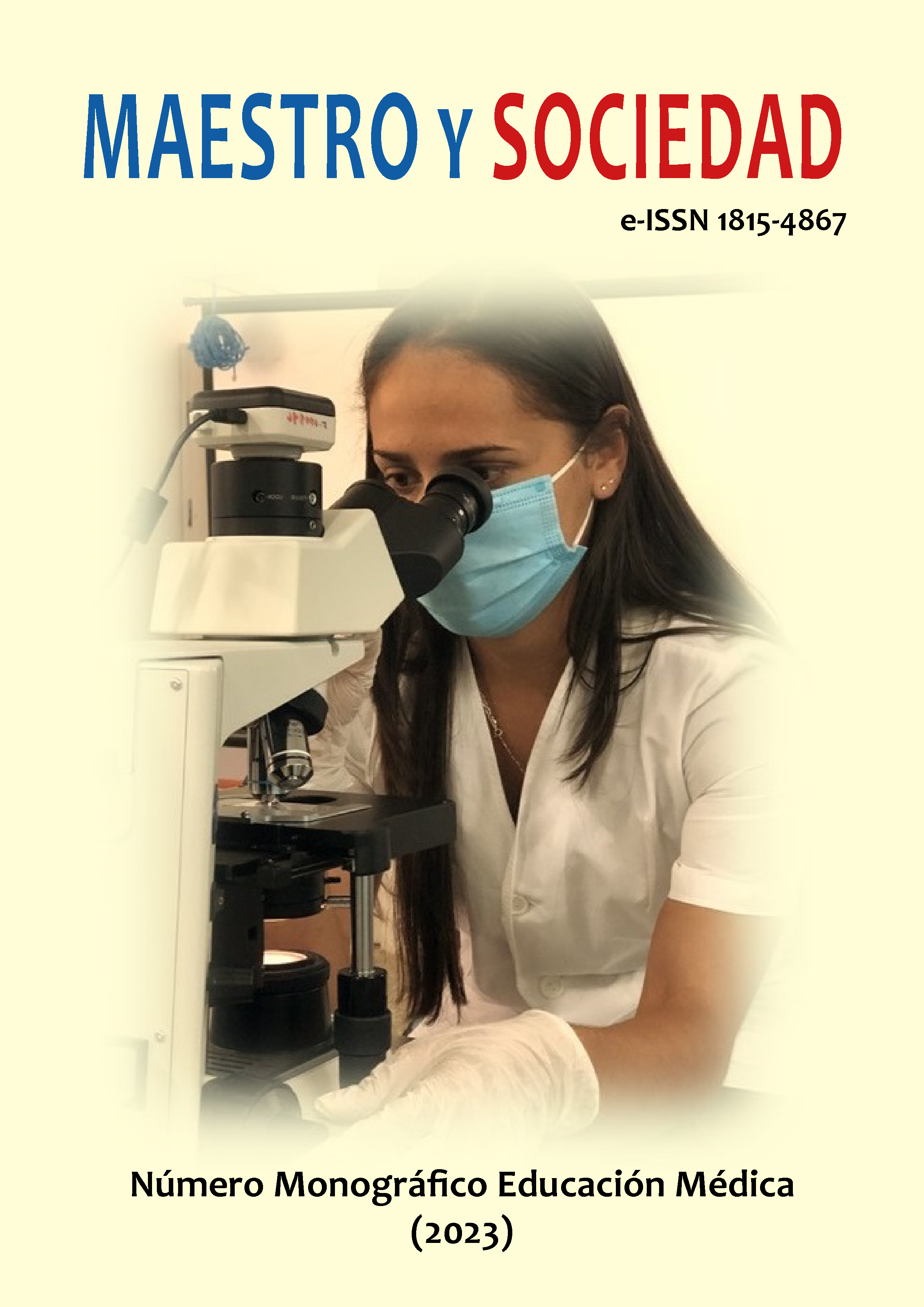Hyper-environment of teaching-learning the infectious disease Cholera
Hyper-environment of teaching-learning the infectious disease Cholera
Keywords:
Educational hyper-environment, teaching-learning process, CholeraAbstract
Introduction: Public Health is one of the sectors favored by the impact of information technology and communications, and in this sense the use of computing to support education, stands as a tangible reality. For this reason, a teaching-learning hyperenvironment of the cholera infectious disease was developed, which serves as complementary material for students of the Health Technology profile in Santiago de Cuba, and which covers basic contents on the subject. Materials and methods: Responding to the aforementioned criteria, the following methods were used in the investigation: Historical-logical method, analysis-synthesis and inductive-deductive. The research techniques used were bibliographic and documentary research. It was directed to the search for information about the disease, in order to adapt it to the objective and serving as support material. They were used to obtain information related to the methodological, computer and user evaluation of the different modules of the hyperenvironment. Results: The hyperenvironment was enriched with suggestions during its creation and start-up journey, contributing to the objective of promoting the comprehensive education of future Public Health professionals. Due to its importance, it was subjected to a process of methodological, computer and user evaluation; obtaining an excellent rating. Discussion: This software, currently available to Health Technology students, ensures feedback, improvement and updating of knowledge about the aforementioned disease; in addition to systematizing educational practices to prevent, control and eradicate adverse health situations. Conclusions: The hyperenvironment constitutes a support tool for Health Technology students, which facilitates the rapid and accurate acquisition of knowledge related to the infectious disease cholera. The teaching-learning hyperenvironment of the cholera infectious disease was certified excellent, based on the three evaluations carried out: methodological, informatics and user; being possible the subsequent implementation of the same.
References
Couterejuzón González, L. (2003). Cumplimiento de los principios didácticos en la utilización de un software educativo para la Educación Superior. Revista Cubana de Educación Médica Superior, 17(1), 52-56. http://scielo.sld.cu/pdf/ems/v17n1/ems06103.pdf
De León Castillo, M. C. (2012). Acercamiento histórico al proceso de enseñanza aprendizaje en las Ciencias Médicas. Revista Cubana de Educación Médica Superior, 26(2). http://www.ems.sld.cu/index.php/ems/article/view/34/30
Hurtado Curbelo, F. J., Coloma Rodríguez, O., Peña Guerrero, Y., Rodríguez Rodríguez, L. A., Nieto Almeida, L. E., y Labañino Rizzo, C. (2009). Uso del software educativo en la escuela cubana y su impacto en el aprendizaje de los estudiantes. Sello Editor Educación Cubana.
Padrón Arredondo, L. J. (2009). Las Nuevas Tecnologías de la Información y las Comunicaciones (NTIC) en la formación del hombre nuevo. Monografías.com. https://www.monografias.com/trabajos23/nuevas-tecnologias/nuevas-tecnologias.shtml
Perdomo González, G. (2007). Algunas consideraciones sobre software educativos en la enseñanza cubana de las Ciencias Médicas. Revista Cubana de Informática Médica, 7(1). http://www.rcim.sld.cu/revista_12/editorial_12.htm
Rodríguez Chávez, L. E. (2000). La computación en la enseñanza de las Ciencias Médicas. Revista Cubana de Informática Médica, 1(1). http://www.rcim.sld.cu/revista_1/articulos_htm/lily.htm
Royce, W. W. (1970, August 25-28). Managing the development of large software systems: concepts and techniques [conference]. Technical Papers of Western Electronic Show and Convention (WesCon). Los Angeles, United States of America. http://www-scf.usc.edu/~csci201/lectures/Lecture11/royce1970.pdf
Ruiz Piedra, A. M., Gómez Martínez, F., y O Farrill Mons, E. (2008). El desarrollo de software educativo en las Ciencias de la Salud. Génesis y estrategias del Proyecto Galenomedia. Período 2004-2007. Revista Cubana de Informática Médica, 8(1). http://www.rcim.sld.cu/revista_15/articulos_pdf/galenomedia.pdf
Urbina Laza, O. (2015). La educación de posgrado en las universidades médicas cubanas. Revista Cubana de Educación Médica Superior, 29(2), 389-397. https://www.medigraphic.com/pdfs/educacion/cem-2015/cem152q.pd
Vidal Ledo, M., Gómez Martínez, F., y Ruiz Piedra, A. M. (2011). Hiperentornos educativos. Revista Cubana de Educación Médica Superior, 25(1), 123-131. http://scielo.sld.cu/scielo.php?script=sci_arttext&pid=S0864-21412011000100012
Downloads
Published
How to Cite
Issue
Section
License
Copyright (c) 2023 María del Carmen Vega Sánchez, Rosa María Panadero Vega, Roxana María Panadero Vega

This work is licensed under a Creative Commons Attribution-NonCommercial-NoDerivatives 4.0 International License.
This journal provides immediate open access to its content, based on the principle that offering the public free access to research helps a greater global exchange of knowledge. Each author is responsible for the content of each of their articles.



























 Universidad de Oriente
Universidad de Oriente 